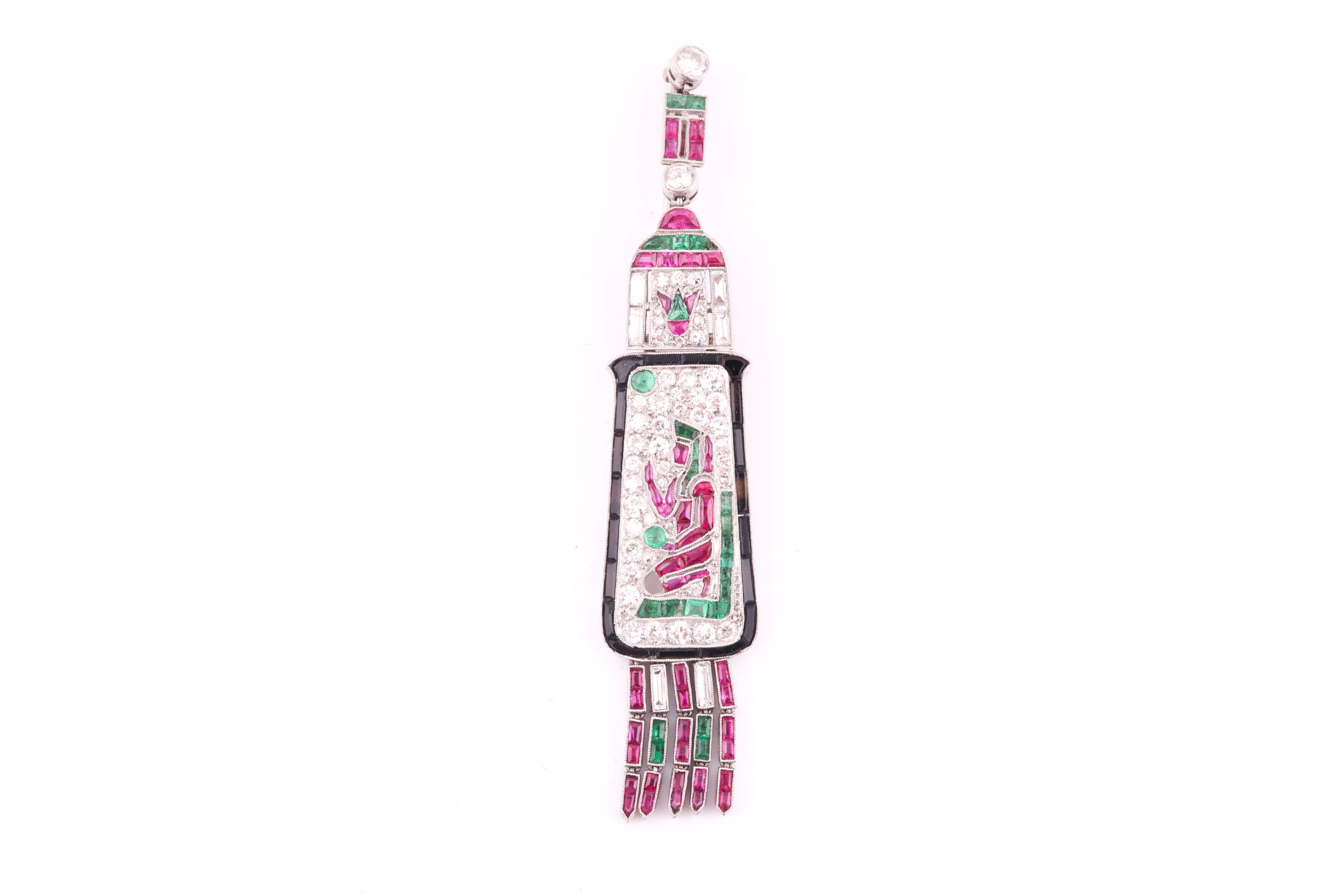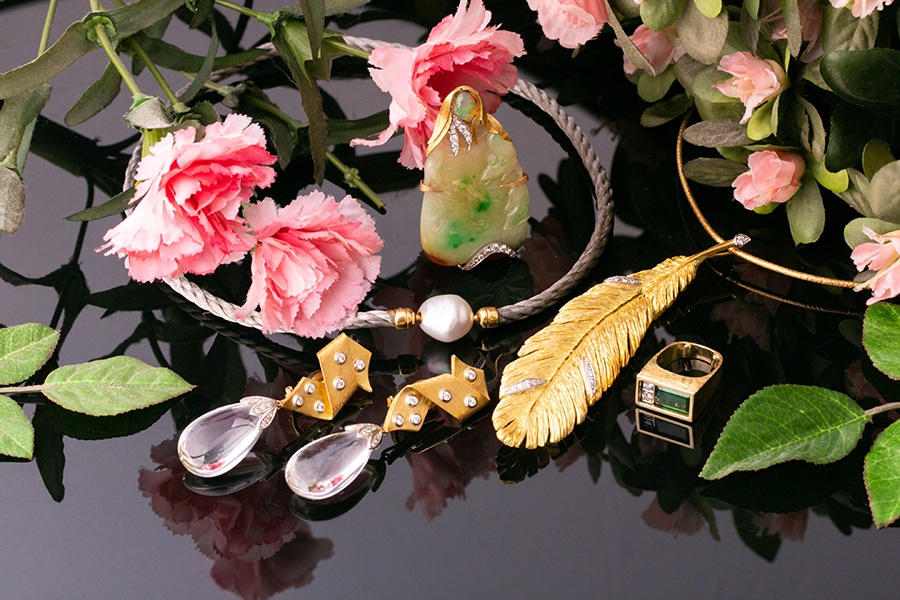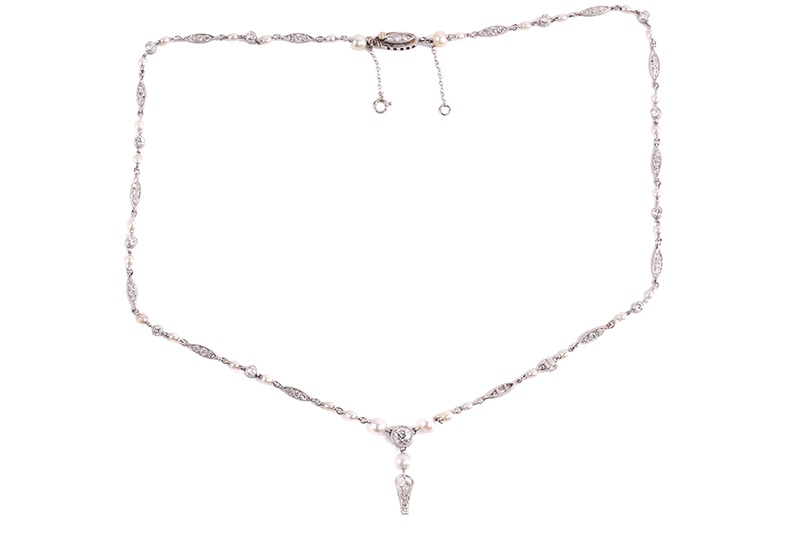How Can You Tell if Jewellery is Vintage?
Expert Tips for Identifying Authentic Vintage Jewellery Pieces
26/04/2023
The term ‘vintage’ refers to pieces of jewellery that are older than 40 years and younger than 100, although some may consider that pieces made in the 1980s fall into this category too.
Vintage jewellery covers three eras which vary in style, design, and composition, namely the Art Deco Era (1915-1935), the Retro Era (1935-1950), and the Modern Era (1950s-1980s). Although the difference between an Art Deco brooch and a modern ring might be obvious, often it can be far more complex, especially where there is an overlap in periods.
 A French Art Deco platinum and multi gem Egyptian revival pendant
A French Art Deco platinum and multi gem Egyptian revival pendant
Identifying Vintage Jewellery Through Hallmarks and Maker’s Marks
Use a loupe (magnification device) to locate any hallmarks, signatures, stamps, and engravings. These marks can identify the exact year in which a piece was produced, where it was made and the maker; all extremely valuable information when you want to determine age. Signatures of houses such as Cartier have changed throughout history… studying and comparing examples can be enlightening. These marks can wear down over years and become illegible.
A Collection of Grima Jewellery
Understanding Vintage Jewellery Materials and Metal Markings
While searching for a hallmark, you might come across another stamp or engraving, which could be in the form of numbers or “carats”. Gold follows the following numerical system, 8ct = 333, 9ct = 375, 14ct = 585, 18ct = 750, 22ct = 916 and 24ct = 999. On white metal pieces, 950 with Pt indicates Platinum and 925 identifies sterling silver, while older pieces may be marked with “Coin Silver” or “Sterling.”
Art Deco jewellery was traditionally made using platinum or white gold. During the world wars, platinum was deemed a strategic metal used for rifle and engine parts, explosives and the making of armaments. Therefore, its use in jewellery was prohibited and a suitable alternative was white gold, introduced during 1915. Synthetic stones were often used in Deco and early 1940s pieces due to supply issues.
Gold was very much the metal of the Retro era, but supply was limited, so cheaper materials such as silver and brass were covered in a thin layer of gold and used instead. Plastic, glass, wood, silver, and enamel were typical 1940s materials, used to create the colourful, eye-catching designs.
An Art Deco chain necklace set with pearls and old-cut diamonds
Spotting Age Through Wear and Tear
Look for signs of wear… older pieces will often display these more evidently. Pay close attention to the band and prongs on rings, hook fittings on earrings, clasps on bracelets and necklaces. Clasps that close smoothly, lustre of pearls, scratches to gemstones, these are all clues to the age of a piece.
Dating Vintage Jewellery by Design & Style
The style of jewellery has evolved over time, but certain designs often come back into fashion. The Architectural geometric designs, symmetry and filigree work which were popular in the 1920s and 1930s regularly inspire modern trends.
How a piece has been made and carved, types of closures, clasps, pins, wires, locks, chains, the overall appearance can offer valuable insight. Pay careful attention for any evidence of repairs or alterations, lead solder repairs can indicate an earlier piece.
Early 20th century brooches were often fitted with a handmade pin, tube hinge and C-clasps, whereas an early version of the modern safety catch used today, became widespread in the late 1920s and early 1930s. One of the most popular clasps used on modern jewellery is the lobster claw, which only started being used in the 1970s.
Vintage jewellery is represented by some truly iconic pieces throughout jewellery history. We hope that you will find these tips useful next time you are considering the age of a piece of jewellery that catches your eye and which may possibly be vintage!
Related Articles
Is There a Market for Vintage Jewellery?
How Do I Know if My Jewellery is Valuable?
Are you considering selling any jewellery?
With a global audience of over 10 million, Dawsons can achieve the best prices at auction.
To sell your jewellery, get in touch with one of our experts today for a free jewellery valuation, we would be delighted to help you.

